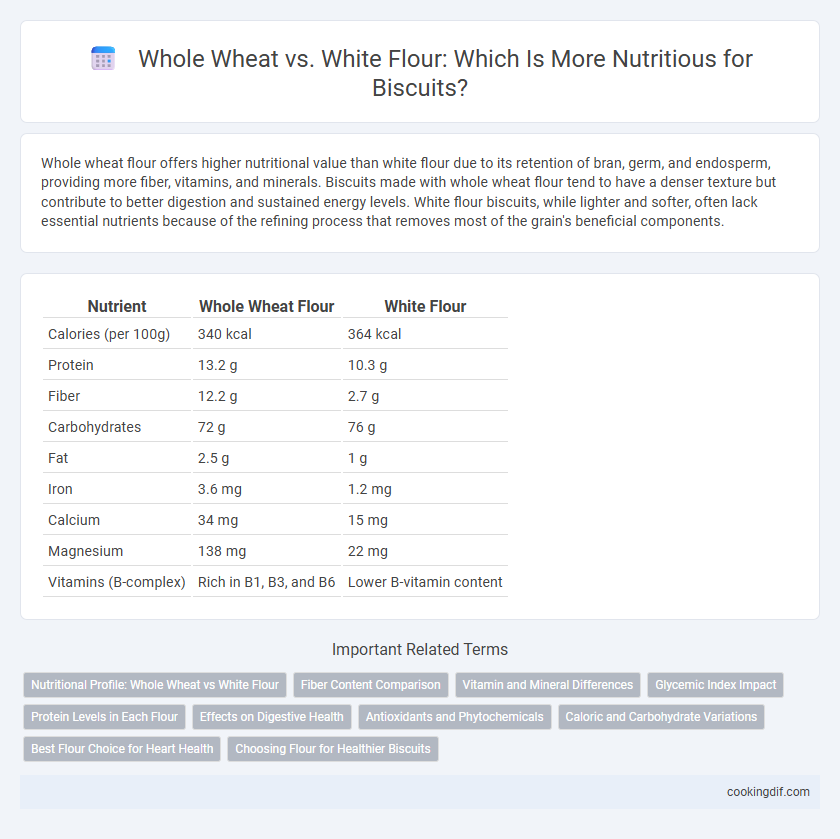Whole wheat flour offers higher nutritional value than white flour due to its retention of bran, germ, and endosperm, providing more fiber, vitamins, and minerals. Biscuits made with whole wheat flour tend to have a denser texture but contribute to better digestion and sustained energy levels. White flour biscuits, while lighter and softer, often lack essential nutrients because of the refining process that removes most of the grain's beneficial components.
Table of Comparison
| Nutrient | Whole Wheat Flour | White Flour |
|---|---|---|
| Calories (per 100g) | 340 kcal | 364 kcal |
| Protein | 13.2 g | 10.3 g |
| Fiber | 12.2 g | 2.7 g |
| Carbohydrates | 72 g | 76 g |
| Fat | 2.5 g | 1 g |
| Iron | 3.6 mg | 1.2 mg |
| Calcium | 34 mg | 15 mg |
| Magnesium | 138 mg | 22 mg |
| Vitamins (B-complex) | Rich in B1, B3, and B6 | Lower B-vitamin content |
Nutritional Profile: Whole Wheat vs White Flour
Whole wheat flour contains higher fiber content, essential vitamins, and minerals such as magnesium, iron, and B vitamins compared to white flour, which is refined and stripped of much of its natural nutrients. The bran and germ in whole wheat provide antioxidants and promote better digestion, making it a more nutrient-dense option. White flour, while offering a finer texture, lacks these components and has a higher glycemic index, potentially leading to quicker blood sugar spikes.
Fiber Content Comparison
Whole wheat flour contains significantly higher dietary fiber, with approximately 12-15 grams per 100 grams, compared to white flour's 2-3 grams, enhancing digestive health and providing a lower glycemic index. The bran and germ retained in whole wheat flour contribute to this fiber content, which aids in regulating blood sugar and promoting satiety. Choosing whole wheat flour for biscuits boosts fiber intake, supporting heart health and sustained energy release.
Vitamin and Mineral Differences
Whole wheat flour contains significantly higher levels of vitamins and minerals compared to white flour, including increased amounts of vitamin B6, folate, magnesium, and iron. White flour is often enriched with some nutrients like iron and folic acid, but it lacks the natural fiber and diverse micronutrients retained in whole wheat bran and germ. Choosing whole wheat flour for biscuits boosts their nutritional value by providing essential minerals and vitamins that support metabolism, bone health, and immune function.
Glycemic Index Impact
Whole wheat flour has a lower glycemic index (GI) compared to white flour, resulting in slower blood sugar spikes and improved insulin response. Biscuits made with whole wheat flour provide higher fiber content and essential nutrients like iron and B vitamins, supporting better metabolic health. Choosing whole wheat over white flour helps manage glycemic impact, beneficial for preventing type 2 diabetes and maintaining sustained energy levels.
Protein Levels in Each Flour
Whole wheat flour contains approximately 13 grams of protein per 100 grams, providing higher protein content than white flour, which has about 10 grams per 100 grams. The increased protein in whole wheat flour contributes to better nutritional value and improved satiety in biscuits. Choosing whole wheat flour enhances the protein intake essential for muscle repair and growth compared to white flour.
Effects on Digestive Health
Whole wheat flour contains higher fiber content compared to white flour, promoting better digestive health by aiding regular bowel movements and supporting gut microbiota. White flour, being refined, lacks bran and germ, which reduces its fiber and nutrient density, potentially leading to slower digestion and increased risk of constipation. Choosing whole wheat biscuits can enhance digestive function and contribute to longer satiety periods.
Antioxidants and Phytochemicals
Whole wheat flour contains higher levels of antioxidants and phytochemicals compared to white flour, contributing to enhanced nutritional benefits in biscuits. These compounds, including phenolic acids and flavonoids, support cellular health and reduce oxidative stress. Choosing whole wheat flour for biscuit recipes can increase intake of these bioactive compounds, promoting overall wellness.
Caloric and Carbohydrate Variations
Whole wheat flour contains more complex carbohydrates and dietary fiber compared to white flour, resulting in a lower glycemic index and more sustained energy release. Calorically, whole wheat flour provides approximately 340 calories per 100 grams, slightly higher due to its intact bran and germ content, while white flour offers around 364 calories per 100 grams but with fewer nutrients. Choosing whole wheat flour enhances biscuit nutrition by increasing fiber intake and moderating blood sugar impact.
Best Flour Choice for Heart Health
Whole wheat flour contains higher levels of fiber, antioxidants, and essential nutrients like magnesium and potassium, which contribute to improved heart health by lowering cholesterol and reducing blood pressure. White flour, stripped of bran and germ, lacks these beneficial components, leading to faster blood sugar spikes and increased cardiovascular risk. Choosing whole wheat flour for biscuits supports better cardiovascular outcomes through sustained energy release and enhanced nutrient intake.
Choosing Flour for Healthier Biscuits
Whole wheat flour contains higher fiber content and more essential nutrients like vitamins B and E compared to white flour, promoting better digestive health and sustained energy release. White flour, while softer and lighter in texture, offers fewer nutrients due to extensive refining processes that remove bran and germ components. Choosing whole wheat flour for biscuits boosts nutritional value and supports heart health by providing complex carbohydrates and antioxidants.
Whole Wheat vs White Flour for nutrition Infographic

 cookingdif.com
cookingdif.com